Njengamartin399
On this page, you find all documents, package deals, and flashcards offered by seller njengamartin399.
- 141
- 0
- 7
Community
- Followers
- Following
148 items
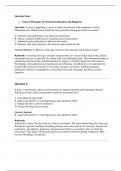
General principles of clinical examination and diagnosis:
1. General Principles of Clinical Examination and Diagnosis Question: A nurse is preparing to assess a client who presents with symptoms of acute abdominal pain. Which action should the nurse prioritize during the initial assessment? A. Perform a thorough head-to-toe physical examination B. Obtain a detailed health history including current medications C. Administer pain medication to alleviate discomfort D. Measure vital signs and assess the intensity and location of pain Correct Answer: ...
- Package deal
- Exam (elaborations)
- • 29 pages •
1. General Principles of Clinical Examination and Diagnosis Question: A nurse is preparing to assess a client who presents with symptoms of acute abdominal pain. Which action should the nurse prioritize during the initial assessment? A. Perform a thorough head-to-toe physical examination B. Obtain a detailed health history including current medications C. Administer pain medication to alleviate discomfort D. Measure vital signs and assess the intensity and location of pain Correct Answer: ...
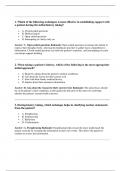
clinical method
all chapters covered
- Package deal
- • 22 items •
- Doctor and patient: General principles of history taking • Exam (elaborations)
- General patient examination and differential diagnosis • Exam (elaborations)
- The next steps: Differential diagnosis and initial management • Exam (elaborations)
- Ethical considerations • Exam (elaborations)
- Women • Exam (elaborations)
- And more ….
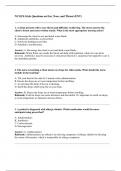
Ear, nose and throat
1. A client presents with a sore throat and difficulty swallowing. The nurse assesses the client’s throat and notes swollen tonsils. What is the most appropriate nursing action? A. Encourage the client to rest and drink warm fluids. B. Administer antibiotics as prescribed. C. Notify the healthcare provider. D. Schedule a tonsillectomy. Answer: A. Encourage the client to rest and drink warm fluids. Rationale: Warm fluids can soothe the throat and help with hydration, while rest can aid in...
- Package deal
- Exam (elaborations)
- • 19 pages •
1. A client presents with a sore throat and difficulty swallowing. The nurse assesses the client’s throat and notes swollen tonsils. What is the most appropriate nursing action? A. Encourage the client to rest and drink warm fluids. B. Administer antibiotics as prescribed. C. Notify the healthcare provider. D. Schedule a tonsillectomy. Answer: A. Encourage the client to rest and drink warm fluids. Rationale: Warm fluids can soothe the throat and help with hydration, while rest can aid in...
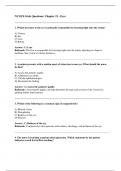
Eyes
1. Which structure in the eye is primarily responsible for focusing light onto the retina? A) Cornea B) Iris C) Lens D) Retina Answer: C) Lens Rationale: The lens is responsible for focusing light onto the retina, adjusting its shape to facilitate clear vision at various distances. ________________________________________ 2. A patient presents with a sudden onset of vision loss in one eye. What should the nurse do first? A) Assess the patient's pupils. B) Administer eye drops. C) C...
- Package deal
- Exam (elaborations)
- • 18 pages •
1. Which structure in the eye is primarily responsible for focusing light onto the retina? A) Cornea B) Iris C) Lens D) Retina Answer: C) Lens Rationale: The lens is responsible for focusing light onto the retina, adjusting its shape to facilitate clear vision at various distances. ________________________________________ 2. A patient presents with a sudden onset of vision loss in one eye. What should the nurse do first? A) Assess the patient's pupils. B) Administer eye drops. C) C...
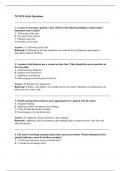
Skin, nails and hair
1. A nurse is assessing a patient's skin. Which of the following findings would require immediate intervention? A. Yellowing of the skin B. Dry skin on the elbows C. Flaking scalp skin D. Freckles on the back Answer: A. Yellowing of the skin Rationale: Yellowing of the skin (jaundice) can indicate liver dysfunction and requires immediate medical attention. ________________________________________ 2. A patient with diabetes has a wound on their foot. What should the nurse prioritize in...
- Package deal
- Exam (elaborations)
- • 17 pages •
1. A nurse is assessing a patient's skin. Which of the following findings would require immediate intervention? A. Yellowing of the skin B. Dry skin on the elbows C. Flaking scalp skin D. Freckles on the back Answer: A. Yellowing of the skin Rationale: Yellowing of the skin (jaundice) can indicate liver dysfunction and requires immediate medical attention. ________________________________________ 2. A patient with diabetes has a wound on their foot. What should the nurse prioritize in...
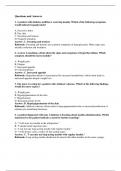
Endocrine and metabolic disorders
1. A patient with diabetes mellitus is receiving insulin. Which of the following symptoms would indicate hypoglycemia? A. Excessive thirst B. Dry skin C. Sweating and tremors D. Frequent urination Answer: C. Sweating and tremors Rationale: Sweating and tremors are common symptoms of hypoglycemia. Other signs may include confusion and weakness. 2. A nurse is teaching a client about the signs and symptoms of hyperthyroidism. Which symptom should the nurse include? A. Weight gain B. Fatigu...
- Package deal
- Exam (elaborations)
- • 14 pages •
1. A patient with diabetes mellitus is receiving insulin. Which of the following symptoms would indicate hypoglycemia? A. Excessive thirst B. Dry skin C. Sweating and tremors D. Frequent urination Answer: C. Sweating and tremors Rationale: Sweating and tremors are common symptoms of hypoglycemia. Other signs may include confusion and weakness. 2. A nurse is teaching a client about the signs and symptoms of hyperthyroidism. Which symptom should the nurse include? A. Weight gain B. Fatigu...
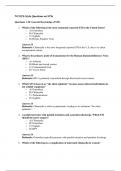
Sexually transmitted infections
1. Which of the following is the most commonly reported STI in the United States? o A) Gonorrhea o B) Chlamydia o C) Syphilis o D) Herpes Simplex Virus Answer: B Rationale: Chlamydia is the most frequently reported STI in the U.S. due to its often asymptomatic nature. 2. What is the primary mode of transmission for the Human Immunodeficiency Virus (HIV)? o A) Airborne o B) Blood and sexual contact o C) Contaminated food o D) Vector-borne Answer: B Rationale: HIV is primarily transmi...
- Package deal
- Exam (elaborations)
- • 14 pages •
1. Which of the following is the most commonly reported STI in the United States? o A) Gonorrhea o B) Chlamydia o C) Syphilis o D) Herpes Simplex Virus Answer: B Rationale: Chlamydia is the most frequently reported STI in the U.S. due to its often asymptomatic nature. 2. What is the primary mode of transmission for the Human Immunodeficiency Virus (HIV)? o A) Airborne o B) Blood and sexual contact o C) Contaminated food o D) Vector-borne Answer: B Rationale: HIV is primarily transmi...
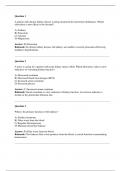
Renal and urology system
A patient with chronic kidney disease is being monitored for electrolyte imbalances. Which electrolyte is most likely to be elevated? A) Sodium B) Potassium C) Calcium D) Magnesium Answer: B) Potassium Rationale: In chronic kidney disease, the kidneys are unable to excrete potassium effectively, leading to hyperkalemia. ________________________________________ Question 2 A nurse is caring for a patient with acute kidney injury (AKI). Which laboratory value is most indicative of worsenin...
- Package deal
- Exam (elaborations)
- • 20 pages •
A patient with chronic kidney disease is being monitored for electrolyte imbalances. Which electrolyte is most likely to be elevated? A) Sodium B) Potassium C) Calcium D) Magnesium Answer: B) Potassium Rationale: In chronic kidney disease, the kidneys are unable to excrete potassium effectively, leading to hyperkalemia. ________________________________________ Question 2 A nurse is caring for a patient with acute kidney injury (AKI). Which laboratory value is most indicative of worsenin...
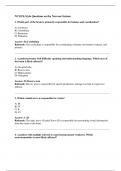
Nervous system
1. Which part of the brain is primarily responsible for balance and coordination? A) Cerebrum B) Cerebellum C) Brainstem D) Thalamus Answer: B) Cerebellum Rationale: The cerebellum is responsible for coordinating voluntary movements, balance, and posture. ________________________________________ 2. A patient presents with difficulty speaking and understanding language. Which area of the brain is likely affected? A) Occipital lobe B) Broca's area C) Hippocampus D) Amygdala Answer:...
- Package deal
- Exam (elaborations)
- • 19 pages •
1. Which part of the brain is primarily responsible for balance and coordination? A) Cerebrum B) Cerebellum C) Brainstem D) Thalamus Answer: B) Cerebellum Rationale: The cerebellum is responsible for coordinating voluntary movements, balance, and posture. ________________________________________ 2. A patient presents with difficulty speaking and understanding language. Which area of the brain is likely affected? A) Occipital lobe B) Broca's area C) Hippocampus D) Amygdala Answer:...
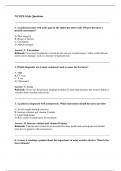
Locomotor system
1. A patient presents with acute pain in the right knee after a fall. What is the nurse's priority assessment? A. Skin integrity B. Range of motion C. Circulation D. Muscle strength Answer: C. Circulation Rationale: Assessing circulation is crucial to rule out any vascular injury, which could indicate more serious damage, such as a fracture or ligament tear. ________________________________________ 2. Which diagnostic test is most commonly used to assess for fractures? A. MRI B. CT ...
- Package deal
- Exam (elaborations)
- • 18 pages •
1. A patient presents with acute pain in the right knee after a fall. What is the nurse's priority assessment? A. Skin integrity B. Range of motion C. Circulation D. Muscle strength Answer: C. Circulation Rationale: Assessing circulation is crucial to rule out any vascular injury, which could indicate more serious damage, such as a fracture or ligament tear. ________________________________________ 2. Which diagnostic test is most commonly used to assess for fractures? A. MRI B. CT ...
